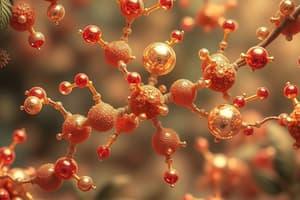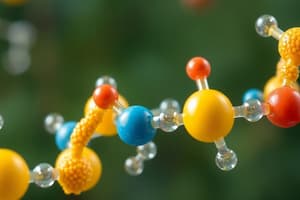Podcast
Questions and Answers
Carbohydrates, particularly fibre, contribute to maintaining the structural integrity of tissues, including the skin, hair, and nails. They are important for providing ____________.
Carbohydrates, particularly fibre, contribute to maintaining the structural integrity of tissues, including the skin, hair, and nails. They are important for providing ____________.
support
Consuming carbohydrates helps regulate metabolism, ensuring that the body has sufficient fuel to carry out daily activities without excessive reliance on fats. Carbohydrates serve as a regulator of ____________.
Consuming carbohydrates helps regulate metabolism, ensuring that the body has sufficient fuel to carry out daily activities without excessive reliance on fats. Carbohydrates serve as a regulator of ____________.
metabolism
Proteins are essential biological macromolecules made up of amino acids linked together by peptide bonds. Humans require 20 different amino acids for protein synthesis, nine of which must be obtained through ____________.
Proteins are essential biological macromolecules made up of amino acids linked together by peptide bonds. Humans require 20 different amino acids for protein synthesis, nine of which must be obtained through ____________.
diet
Unlike carbohydrates and lipids, proteins provide no energy directly but play vital roles in bodily functions, including serving as building blocks for cells and as ____________.
Unlike carbohydrates and lipids, proteins provide no energy directly but play vital roles in bodily functions, including serving as building blocks for cells and as ____________.
Lipids are a diverse group of organic compounds that consist of fatty acids bound to glycerol or cholesterol, making them insoluble in water. They provide energy and serve various functions in the body, such as energy storage and ____________.
Lipids are a diverse group of organic compounds that consist of fatty acids bound to glycerol or cholesterol, making them insoluble in water. They provide energy and serve various functions in the body, such as energy storage and ____________.
Lipids serve as an alternate energy store when carbohydrates are limited. They provide a protective layer around cells, protecting them from physical damage. This is an example of lipids' role in cell ____________.
Lipids serve as an alternate energy store when carbohydrates are limited. They provide a protective layer around cells, protecting them from physical damage. This is an example of lipids' role in cell ____________.
Carbohydrates are the primary source of energy for humans, providing 4 Kilocalories (kcal) per gram. They are derived from organic compounds containing carbon, hydrogen, and ______, typically with a ratio of approximately 1:2:1.
Carbohydrates are the primary source of energy for humans, providing 4 Kilocalories (kcal) per gram. They are derived from organic compounds containing carbon, hydrogen, and ______, typically with a ratio of approximately 1:2:1.
Simple sugars, such as monosaccharides and disaccharides, are absorbed directly into the bloodstream after consumption, while polysaccharides, such as starch and ______, are broken down into simple sugars during digestion.
Simple sugars, such as monosaccharides and disaccharides, are absorbed directly into the bloodstream after consumption, while polysaccharides, such as starch and ______, are broken down into simple sugars during digestion.
Carbohydrates play crucial roles in maintaining gut health and immune function, and they can be found in various plant-based foods, including grains, fruits, vegetables, and ______.
Carbohydrates play crucial roles in maintaining gut health and immune function, and they can be found in various plant-based foods, including grains, fruits, vegetables, and ______.
Carbohydrates are the primary fuel source for muscles and brain, as they are quickly converted into glucose, which can be easily utilised for energy production. In the context of nutrition, carbohydrates serve as the primary source of ______.
Carbohydrates are the primary fuel source for muscles and brain, as they are quickly converted into glucose, which can be easily utilised for energy production. In the context of nutrition, carbohydrates serve as the primary source of ______.
Biological macromolecules are primarily categorized into three groups: carbohydrates, proteins, lipids, and vitamins and ______.
Biological macromolecules are primarily categorized into three groups: carbohydrates, proteins, lipids, and vitamins and ______.
Proteins play a crucial role in building and repairing tissues, supporting immune function, and serving as enzymes and hormones. They are made up of amino acids and can be found in sources like meat, dairy, legumes, and ______.
Proteins play a crucial role in building and repairing tissues, supporting immune function, and serving as enzymes and hormones. They are made up of amino acids and can be found in sources like meat, dairy, legumes, and ______.
Flashcards are hidden until you start studying
Study Notes
Biological Macromolecules as Nutrient Sources: Carbohydrates, Proteins, Lipids, and Vitamins & Minerals
Biological macromolecules are essential for providing the nutrients required by organisms to maintain various functions and metabolic processes. These macromolecules are primarily categorised into three groups: carbohydrates, proteins, lipids, and vitamins and minerals. Let's delve deeper into each category and understand their role in the context of nutrition.
Carbohydrates
Carbohydrates are the primary source of energy for humans, providing 4 Kilocalories (kcal) per gram. They are derived from organic compounds containing carbon, hydrogen, and oxygen, typically with a ratio of approximately 1:2:1. Simple sugars, such as monosaccharides and disaccharides, are absorbed directly into the bloodstream after consumption, while polysaccharides, such as starch and cellulose, are broken down into simple sugars during digestion. Carbohydrates play crucial roles in maintaining gut health and immune function, and they can be found in various plant-based foods, including grains, fruits, vegetables, and milk.
Roles and Functions
In the context of nutrition, carbohydrates serve multiple purposes:
- Primary source of energy: Carbohydrates are the primary fuel source for muscles and brain, as they are quickly converted into glucose, which can be easily utilised for energy production.
- Structural support: Certain carbohydrates, particularly fibre, contribute to maintaining the structural integrity of tissues, including the skin, hair, and nails.
- Regulator of metabolism: Consuming carbohydrates helps regulate metabolism, ensuring that the body has sufficient fuel to carry out daily activities without necessitating excessive reliance on fats as a source of energy.
Proteins
Proteins are essential biological macromolecules made up of amino acids, which are linked together by peptide bonds. Humans require 20 different amino acids for protein synthesis, nine of which cannot be produced internally and must be obtained through diet. Unlike carbohydrates and lipids, proteins provide no energy directly but serve vital roles in bodily functions, including:
- Building blocks for cells: Proteins are the building blocks for various cell structures, such as cell membranes and enzymes.
- Enzymes: Proteins catalyse critical biochemical reactions and help break down macromolecules like carbohydrates, lipids, and nucleic acids.
- Antibodies: Proteins, specifically immunoglobulin proteins, play a central role in the immune system as they recognise and neutralise foreign particles.
Roles and Functions
Proteins play a myriad of roles in the body:
- Growth and repair: Proteins are essential for building and repairing body tissues, which includes muscle tissues and connective tissue.
- Metabolism: Proteins facilitate the conversion of food into energy and aid in removing waste products from the body.
- Immune function: Proteins, such as antibodies, defend against infection and illness by targeting foreign microbes and toxins.
Lipids
Lipids are a diverse group of organic compounds that consist of fatty acids bound to glycerol or cholesterol, making them insoluble in water. They provide energy (roughly 9 kcal per gram) and serve various functions in the body:
- Energy storage: Lipids are stored in the body as triglycerides, providing a reserve of energy when carbohydrate stores are low.
- Insulation: Lipids are present in cell membranes and provide a protective barrier, preventing internal components from interacting with external fluids.
- Signalling: Some lipids, such as leukotrienes and prostaglandins, participate in signalling processes that control inflammation and blood clotting.
Roles and Functions
The roles of lipids in the body include:
- Stored energy: Lipids serve as an alternate energy store when carbohydrates are limited.
- Cell protection: Lipids provide a protective layer around cells, protecting them from physical damage and foreign particles.
- Regulation of metabolic processes: Lipids play a part in controlling vital functions, such as the inflammatory response and blood clotting.
Vitamins and Minerals
Vitamins and minerals are micro-nutrients, which are organic or inorganic molecules required in small quantities for proper bodily functions and maintenance. Though not considered macromolecules, they are integral to the overall process of nutrition:
- Vitamins: Organic molecules that cannot be synthesised in the body and must be obtained from food. There are 13 essential vitamins, which are divided into fat-soluble (A, D, E, K) and water-soluble (B1, B2, B3, B5, B6, B7, B9, B12, and C) vitamins.
- Minerals: Inorganic molecules that are essential for normal growth, development, and maintenance of the body. Examples include calcium, magnesium, iron, and zinc.
Roles and Functions
Vitamins and minerals play crucial roles in the body:
- Promote healthy growth and development: They are involved in the creation and maintenance of bones, teeth, and other tissues.
- Support metabolic processes: They assist in converting food into energy, maintaining healthy skin, and aiding immune function.
- Prevent specific deficiency diseases: Each vitamin and mineral serves a unique purpose and deficiencies can result in conditions like scurvy and rickets.
In summary, biological macromolecules, including carbohydrates, proteins, lipids, and vitamins/minerals, are essential nutrient sources for living organisms. These macromolecules perform varying functions, from providing energy to supporting growth and repair, maintaining metabolic processes, and promoting immune function. Understanding the role of these molecules in our bodies and obtaining them through a balanced diet is crucial for maintaining optimal health and wellbeing.
Studying That Suits You
Use AI to generate personalized quizzes and flashcards to suit your learning preferences.




